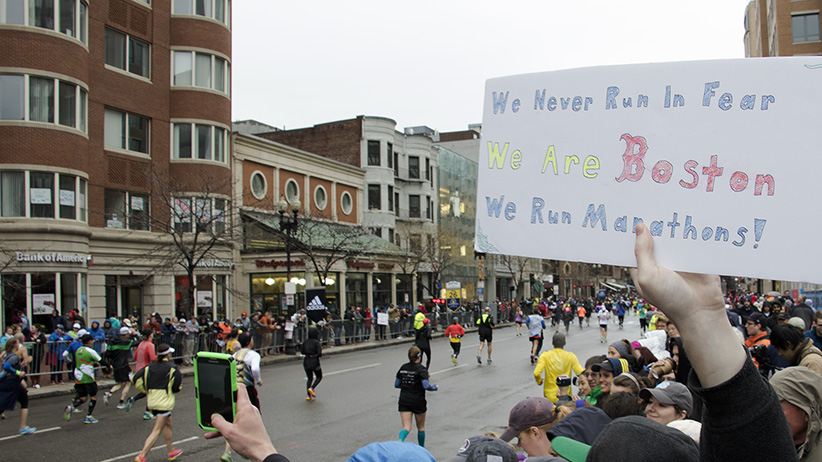At the Boston Marathon: ‘Raising a middle finger to those brothers’
With one of the bombers facing the death penalty, the marathon went on defiantly but still different than before
Boston, Massachusetts A spectator holds up a sign of defiance to the attacks on the 2013 Boston Marathon on Boylston Street. Photograph by Adnan R Khan.
Share

Two years after the bombing that killed three people and permanently maimed dozens more, the 119th running of the Boston Marathon was both a triumph and a reminder of the loss of innocence.
It was a sweet bit of revenge for many of the thousands of people lining Boylston Avenue in Boston’s downtown core. Despite the rain and wind, they cheered and chanted, ringing cow bells and blowing horns, as runners rounded the bend from Hereford Street and stared down the final stretch to the finish line.
In that last bit, some of the Boston Marathon’s most dramatic moments have played out, where the crowds are thickest and the camera crews most dense. But, for those exact reasons, it was also where, in 2013, two brothers, Tamerlan and Dzhokhar Tsarnaev, set off two pressure-cooker bombs filled with nails and ball bearings. Like the many terrorist acts that have come before, the goal of the Tsarnaev brothers was spectacle, and they achieved their goal.
Two years later, the memory of that tragic event, in which three people died, including eight-year-old Martin Richard, and 17 others lost limbs, still haunts Boston. It was visible on race day in the camouflaged national guardsmen patrolling up and down the entire 42-km-long route, the security contractors in flack jackets manning bridges, side arms strapped to their thighs in that cavalier way so emblematic of the hired gun, and in the thorough security screenings set up around the downtown core.
This was a particularly sensitive race. Dzhokhar Tsarnaev’s trial concluded on April 8 and he was found guilty on all 30 counts. (His brother died in a hail of police bullets two days after the 2013 attack.) On the morning of April 21, a day after the race, the sentencing phase began, in which Tsarnaev faces the death penalty. “We’re worried about somebody trying to make a statement,”one police officer on duty at the race said, requesting anonymity.
But the only statement being made on Boylston was defiance. In the days leading up to the April 20 race, the street was lined with Boston Strong daffodils, tourists flocked to the finish line for a chance to have their pictures taken, and Bostonians revelled in the spring warmth at bars and cafés after one of the worst winters in living memory. The mood was upbeat and lively.
The rain and cold on race day did little to temper the mood. Boylston was packed many rows deep, particularly around the two spots where the bombs detonated. “We’re raising our collective middle finger to both those brothers,” Peter Granger, a 43-year-old father of two, said. “The dead one, too.”
“He’s looking at death, or something even worse—an entire lifetime in prison,” Stephanie Franklin, a 60-year-old grandmother whose husband ran the race for his eighth time, said about Tsarnaev. “Here we are, right on the spot where he left that bomb, looking at some of the most inspiring people in the world achieve their dream of crossing the finish line at the Boston Marathon. So what did Tsarnaev really accomplish in exchange for his life? Nothing.”
The defiance in Boston does have a darker edge to it, however. For some, at least, something has been lost. “Before, I wouldn’t have associated the Boston Marathon with the city or with standing up to tragedy,” Eileen Chow a 26-year-old marketing consultant whose sister ran the marathon for the first time, said. “I would associate it with charity or fundraising for particular causes. Now I think it’s a bit different, because we think people [could be] putting their lives on the line, too.”
That overarching fear adds a new challenge to the already difficult task of marathon running. Boston joins the infamous ranks of cities around the world that have been targeted by terrorists. The legacy of that trauma hangs over the city. For runners such as Chow’s sister, Charlene, the consequences directly affect her thinking.
“How do you go on living life without being paranoid?” she said two days before the race. “There’s going to be a large police presence. Security will be tighter than it’s ever been. It was the same last year, as well. Personally, I don’t really want to ask people to be at the finish for me, in case something does happen.”
In the end, there was no one to greet her at the finish line. Soaking wet and sobbing, she made her way to receive her medal alone. But there was a bright side: Friends were waiting for her at a party nearby. There would be celebrations, as there always are at the end of the Boston Marathon, but, like so much else, they would be changed.